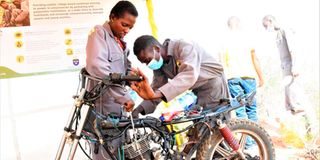Samburu mother of two, married off at 13, now a qualified mechanic

Naitabau Laantare (left) repairs a motorcycle at Wamba area in Samburu East on July 15, 2021.
What you need to know:
- Naitabau Laantare always wanted to go to school, get a good job and alleviate her family from the yoke of poverty; but was married off at 13.
- Five years into marriage, she is among the beneficiaries of a free training program that has enabled her to become a motorbike mechanic in her village.
Born in a family of five at Lodung’okwe village in Samburu East, Naitabau Laantare always wanted to go to school, get a good job and alleviate her family from the yoke of poverty.
Unknown to her, however, she risked being married off at a tender age, or never setting foot in a classroom like other pastoral girls. She fell victim.
Disregard of girls’ education due to the notion that they will leave their parents’ home for marriage, continues to threaten their empowerment. The Samburu culture portrays women as the weaker sex and requiring them to obey, respect and submit to men.
Naive, confused and worried over what would follow, Ms Laantare painfully endured the harmful custom and was married off at the age of 13 years. She could not question her father’s demands first for being a child, and second, a girl.
Forceful marriage
“It was my worst day. I could not believe I was forcefully being married to a man I never knew. I could not question his (dad) decision; I had to go,” she painfully remembers.
Initially, she lived in solitude but as time went on, she got accustomed to the new life, which she says is not the life she wanted.
“I was reduced to a housewife and child bearer. The new responsibilities could not allow me achieve my education dream,” the 18-year-old says during an interview with nation.africa.
Five years into marriage, Ms Laantare still hopes to become financially independent.
She is among the beneficiaries of a free training program being offered by the Northern Rangelands Trust (NRT) and Embassy of Sweden under the Imara program consortium.
The Ujuzi Manyattani program provides mobile and village-based training to people living within community conservancies in mechanics, masonry, carpentry, welding and mobile phone repair, among other courses.
The training, offered by technical colleges, seeks to offer the residents who have never set foot in a classroom, skills to start their own businesses for reliable income and an alternative to livestock keeping, which is no longer sustainable due to climate change, drought and banditry.
Trained mechanic
The mother of two is now a trained mechanic. She repairs motorcycles at her village and earns at least Sh3,500 a week.
“I earn income from repairing engine and wiring, which complements my husband’s income and I am so grateful for the skills. I can now save for my education,” an elated Ms Laantare says.
On why she ‘fell in love’ with a dismantled motorbike engine, she says she wanted to do something different and break the cultural barriers that portray women as weaker sex.
“Some of my friends discouraged me when I chose to undergo the three-month-course, but I was determined to make inroad in the male-dominated work,” she says adding, “Women should not shun careers considered masculine but seize any available opportunities.”
NRT CEO Tom Lalampaa, says the program that has seen hundreds of Morans abandon cattle rustling to venture into their own businesses, targets more than 1,500 youths.

Florence Lolchuraki (right) and Naomi Lekiluai (centre) repair mobile phones at Archers Post in Samburu East on July 15, 2021.
Unlike the mechanic, Naomi Lekiluai and Florence Lolchuraki from Leerata and Archers Post were lucky to be educated up to secondary school level but financial constraints prevented them from proceeding to college.
The alumnae of Wamba Girls Secondary School also benefited from the Ujuzi Manyattani program and now offer mobile phone repair services.
“I have a small kiosk from where I repair phones. I replace screens, battery connectors and flush the gadgets,” 26-year-old Ms Lekiluai says, adding that she makes between Sh400 and Sh700 daily.
The third born in a family of seven hopes to save enough money to pay for her tertiary education beginning next year.
Ms Lolchuraki, 23, sold beadwork products before joining the program.
“I am comfortable and passionate about mobile phone repair,” she says stressing that what a man can do, a woman can do better.





